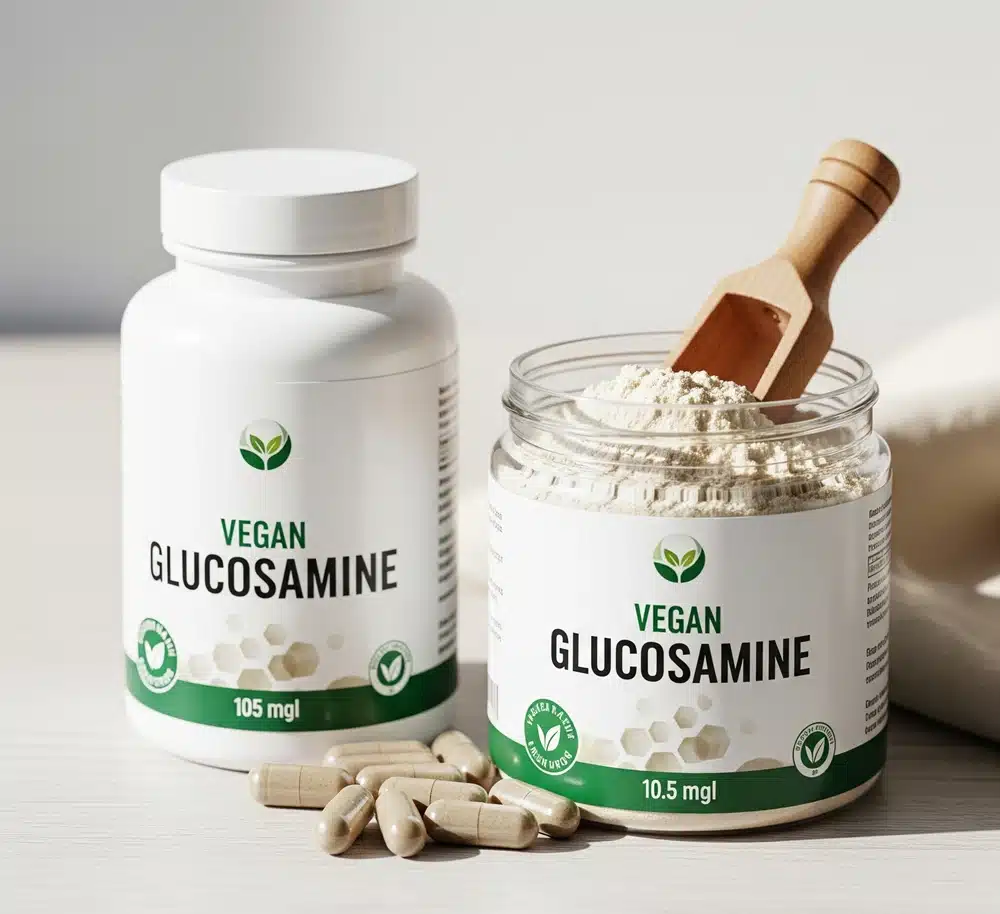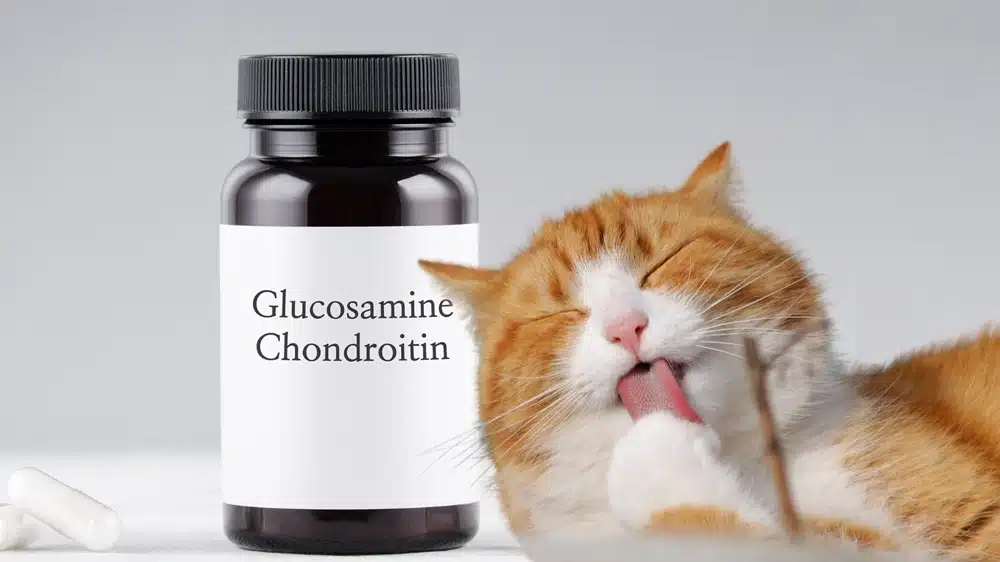
If you follow a plant-based lifestyle, you’re likely mindful of where your nutrients come from—and that concern extends to your supplements. When it comes to supporting joint health, glucosamine is one of the most popular ingredients on the market. But there’s a catch: traditionally, it’s derived from shellfish, making it off-limits for vegans, vegetarians, and anyone with a shellfish allergy.
Fortunately, a powerful, plant-based solution exists. Vegan glucosamine offers the same joint-supporting benefits without any animal-derived ingredients.
In this complete guide for 2025, we’ll cover everything you need to know about this innovative ingredient, from how it’s made to its key benefits for your long-term mobility and comfort.
What Is Vegan Glucosamine?
Vegan glucosamine is a modern, plant-based form of a compound essential for building and maintaining healthy cartilage in your joints. While traditional glucosamine is extracted from the shells of crabs, shrimp, and other shellfish, the vegan version is created through a natural fermentation process, making it a leading-edge joint health supplement.
Typically, it starts with a simple source like corn. Through fermentation, microorganisms break down the corn sugar and convert it into glucosamine. The final product is a pure, stable glucosamine hydrochloride (C6H13NO5⋅HCl) that is chemically identical to its animal-based counterpart. This means it delivers the exact same joint-supporting benefits without any of the ethical or allergen-related concerns, making it the perfect choice for a plant-forward lifestyle.
Key Benefits for Joint Health
Because it is bio-identical to traditional glucosamine, the vegan version offers a full range of benefits for long-term joint health and comfort. Here’s how that translates to real life:
An Ethical and Allergen-Free Option: This is a crucial advantage. Imagine someone with a severe shellfish allergy who has wanted to try glucosamine for their joint discomfort but couldn’t. The vegan version provides them a safe and effective way to access those same benefits.
Supports Healthy Cartilage: Glucosamine is a natural building block of cartilage—the tough, flexible tissue that cushions your joints. For example, a long-distance runner might take it to help protect their knee cartilage from the constant impact, supporting joint health for years to come.
Improves Mobility and Reduces Stiffness: By supporting cartilage health, vegan glucosamine can help reduce joint stiffness and discomfort. For instance, someone who struggles with stiffness in their hands might find daily tasks like gardening or opening a jar become easier after consistent use.
Traditional Glucosamine vs. Vegan Glucosamine: A Clear Choice
When considering a glucosamine supplement, it’s essential to understand the key differences between the traditional and vegan forms. While both offer valuable support for joint health, their origins, production methods, and suitability for various dietary needs set them apart.
| Feature | Traditional Glucosamine (Shellfish-Derived) | Vegan Glucosamine (Plant-Derived) |
|---|---|---|
| Source | Chitin extracted from the shells of crabs, shrimp, and other crustaceans. | Fermentation of plant-based sources (e.g., corn) by microorganisms. |
| Composition | Typically Glucosamine Sulfate or Glucosamine HCl. Chemically identical to vegan. | Almost exclusively Glucosamine HCl. Chemically identical to traditional. |
| Dietary Suitability | Not suitable for vegans, vegetarians, or kosher/halal diets. | Suitable for vegans, vegetarians, and all dietary preferences. |
| Allergy Risk | High risk for individuals with shellfish allergies. | No risk for shellfish allergies. |
| Sustainability | Relies on sourcing from marine life, which can raise sustainability concerns. | Sustainable production from renewable plant resources. |
| Efficacy | Well-researched, proven effective for joint health. | Equally effective as traditional, offering the same benefits. |
| Purity | Can have potential for marine contaminants or allergens. | Generally considered very pure; free from marine contaminants. |
As you can see, while the joint-supporting benefits are largely the same, vegan glucosamine offers significant advantages in terms of ethical sourcing, allergen safety, and broad dietary compatibility. For many, this makes it the superior choice for a modern joint health supplement.
How to Choose the Best Vegan Glucosamine Supplement
With the growing popularity of plant-based supplements, the market is full of options. However, not all vegan glucosamine products are created equal.
Consider Combination Formulas: Many of the best joint health supplements combine vegan glucosamine with other beneficial ingredients. Look for formulas that include plant-based chondroitin, MSM (methylsulfonylmethane), or anti-inflammatory herbs like turmeric or boswellia for enhanced synergistic effects.
Check the Dosage and Form: Look for supplements that provide an effective daily dose, which is typically 1500 mg of glucosamine. The most common and stable vegan form is Glucosamine Hydrochloride (HCl), which is known for its purity.
Verify Third-Party Testing: Reputable brands will voluntarily send their products to independent labs for testing. Look for certifications from organizations like NSF International, USP, or ConsumerLab.com on the label. This ensures the product is pure, potent, and free from contaminants.
Read the Ingredient Label Carefully: A quality supplement should have a clean label. Watch out for unnecessary fillers, artificial colors, binders, or common allergens. The focus should be on the active ingredients.
Who Should Take Vegan Glucosamine?
Vegan glucosamine is a versatile supplement that can benefit a wide range of individuals looking to support their joint health. While its plant-based origin makes it particularly suitable for some, its effectiveness ensures broad appeal.
Athletes and Active Individuals: Regular physical activity, especially high-impact exercise, can put stress on joints. Vegan glucosamine can help maintain cartilage integrity and support recovery, helping active individuals stay mobile and comfortable.
Vegans and Vegetarians: This is the most obvious group. For anyone committed to an animal-free diet, vegan glucosamine provides a crucial alternative to traditional shellfish-derived products, ensuring they don’t compromise their dietary principles for joint support.
Individuals with Shellfish Allergies: Shellfish allergies can be severe and life-threatening. Vegan glucosamine completely removes this risk, offering a safe path to joint health benefits for those who must avoid crustaceans.
Anyone Seeking a Clean, Plant-Based Supplement for Joint Support: Even if you’re not strictly vegan, you might prefer supplements made from natural, non-animal sources. Vegan glucosamine appeals to those looking for “clean label” products and a more sustainable choice for their health and the planet.
Conclusion: The Clear Choice for Modern Joint Care
Navigating the world of supplements can be complex, but when it comes to joint support, the choice is clearer than ever. Vegan glucosamine stands out as a premier option among modern joint health ingredients, delivering the same powerful benefits as its shellfish-derived counterpart without the ethical or allergen-related drawbacks.
By choosing a high-quality product, you can support your cartilage, improve mobility, and maintain an active lifestyle with confidence. When making your selection, always look for supplements that are transparent about their sourcing and quality, often relying on trusted manufacturers like GENSEI to provide pure, effective ingredients.
Ultimately, vegan glucosamine is more than just an alternative—it’s an evolution in joint care, offering a safe, sustainable, and effective solution for everyone.
FAQs
Is vegan glucosamine as effective?
Studies and testing have shown that vegetarian or vegan glucosamine is as effective as glucosamine derived from shellfish.
What are the side effects of vegan glucosamine?
Vegan glucosamine has a lower risk of side effects compared to shellfish-derived glucosamine because it eliminates the risk of a shellfish allergy. Some people may experience mild, temporary side effects such as nausea, headaches, or bloating.
Why don’t doctors recommend glucosamine?
While some people find it helpful, the evidence for glucosamine’s effectiveness is mixed. Some studies show a benefit, while others do not. Doctors may also be cautious due to potential interactions with other medications or conditions, such as glaucoma.
What is a substitute for glucosamine?
Chondroitin is a common substitute, as it is also a building block of cartilage. Other supplements for joint health include fish oil, turmeric, and collagen.
What is a vegan alternative to chondroitin?
Since chondroitin is usually sourced from animal cartilage (like shark cartilage), a plant-based alternative called Phytodroitin™ has been developed.
What is the hardest vitamin for vegans?
Vitamin B12 is often considered the most difficult vitamin for vegans to get, as it is primarily found in animal products. Vegans must supplement with B12 or consume B12-fortified foods.
Is glucosamine hard on the liver?
Glucosamine has been linked to a few isolated cases of liver injury, but such occurrences are considered very rare.
Is glucosamine better than turmeric?
Glucosamine and turmeric work in different ways. Glucosamine helps support joint structure and can slow cartilage deterioration, while turmeric (specifically its active compound curcumin) is a powerful anti-inflammatory that helps reduce pain and swelling. Both can be beneficial for joint health.
Why should people over 60 not take glucosamine?
People over 60, especially those with a family history of glaucoma, should consult a doctor before taking glucosamine. There is some concern that it may increase eye pressure.
Which is better for arthritis, collagen or glucosamine?
Both collagen and glucosamine are beneficial for joints. Glucosamine is more focused on supporting cartilage and synovial fluid, while collagen is a major building block for cartilage, ligaments, and tendons. The best choice may depend on the specific type of joint issue.
What plants contain glucosamine?
While glucosamine is not naturally abundant in plants, it can be produced from them. Vegan glucosamine is made through a fermentation process using plant-based ingredients like non-GMO corn. The seed of the palmyrah plant is one example of a plant that contains glucosamine.
referenced
1.For General Information on Glucosamine
Source: Mayo Clinic – Glucosaminehttps://www.mayoclinic.org/drugs-supplements-glucosamine/art-20362874
2.For Scientific Evidence on Efficacy
Source: National Center for Biotechnology Information (PubMed) – “Efficacy of Glucosamine hydrochloride in the treatment of knee osteoarthritis”https://pmc.ncbi.nlm.nih.gov/articles/PMC3392795/



